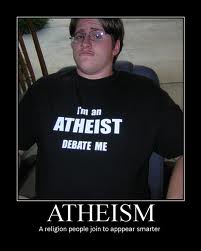
“Don’t be surprised to find out that there are atheists and agnostics in your midst,” Ted said to me, after railing against the evils of organized religion. I got the impression he expected some kind of visible reaction from me.
But I wasn’t surprised. He’d already said he was a humanist. The two kind of go together. Besides, I’m not horrified over atheists. I took the bait.
You wanna discuss atheism, Ted? Let’s discuss atheism. “So, I get that you have problems with organized religion, Ted. But human organizations aside, do you believe there is a God? Or do you believe there is not a God?”
Ted didn’t give me a straightforward answer, though. Instead he referred me to Sam Harris, one of his “favorite authors and Freethinkers,” who takes issue with some Catholic teachings and other Christian ideas about God. That was fine for Sam Harris, but Ted didn’t answer for himself. So I repeated the question.
This time he answered. “I don’t believe there is a God,” he said, and followed up with a caricature of Christianity. “I don’t believe there is a supreme being that created the universe; and sits in heaven and watches every movement and monitors the thoughts of every human. I see very clearly the problems of organized religion...the hypocrisies, the greed, the sadistic, bullying behavior.”
Now I had something to work with.In the language of basic logic of reasoning from premises (P) to conclusions (C), I reflected his own reasoning back to him. “Ok, Ted, correct me if I'm wrong. From what I'm hearing, your reasoning goes something like this:
P: People associated with organized religion have engaged in objectionable behavior.
C: Therefore, there is no God.”
Since he’d quoted Sam Harris, I did the same for Harris’s reasoning. “And Sam Harris’s reasoning goes something like this:
P: The character traits of God as presented by some organized religions are objectionable to me.
C: Therefore, there is no God.”
At this, Ted clarified himself a bit. He was a “science guy,” and God, if he exists, is either “impotent...or evil.” And then he was ready to be done with it. “But, enough about what I think,” he said, and he shifted the subject to something else.
This exchange illustrates something about non-theists, whether they call themselves humanists, agnostics, atheists, freethinkers, or whatever label they prefer. At root, the atheist’s position is intellectually unsound.
Here’s another example:
Ivan: “I’m definitely an atheist. I am an atheist because I cannot believe in fantasy. There is no God. There is no Heaven. There is no Hell. That stuff was created by man to help man feel better about himself. When I look at the scientific facts, I cannot believe in that. So yes, I am an atheist. Absolutely.”
Terrell: “Which scientific facts?”
Ivan read off statistics about the size of the universe, emphasizing its vastness. “To think that there’s some type of supreme being, call it God or Jesus, that is bigger than that? That is concerned about us on earth? About our welfare? About our future? It’s absolutely preposterous,”
Ivan’s reasoning went like this:
P: The universe is really huge.
C: Therefore, there is no God.
Like Ted, Ivan considers himself a “science guy.”
Well, I like science, too. And, sure, the size of the universe is a marvel. But it says nothing about the existence or non-existence of God. Nothing, whatsoever. Soon, Ivan was ready to call it quits too. “I believe that at some point, people end up with firm convictions,” he wrote to me in an e-mail. “Their viewpoints should be respected and further attempts to convert them should be avoided because not everybody wants to be converted.”

Ahh, now we have arrived at the heart of the matter:
Not everybody wants to be converted. These two exchanges expose the heretofore hidden reality that Ted and Ivan have made
a personal, philosophical faith choice to disbelieve. Believers need to remember this and press those vocal non-theists to make their case. The prevailing posture among atheism says the atheistic worldview is more intellectually sound and evolutionarily advanced—that atheism is the belief anyone would come to if he merely examined the scientific facts, all other belief systems being vestiges of Stone Age superstition on a par with moon worship and child sacrifice. But it’s not. Get the facts out in the open and it becomes pretty obvious. Theism stands. Atheism falls. Because there really is a God who created the universe.
The smart atheists seem to know this. Tom Gilson invited David Silverman, president of American Atheists, to co-sponsor an open, reasoned debate at the
Reason Rally which will take place this weekend.
He declined. William Lane Craig invited Richard Dawkins to debate.
He declined. Nevertheless, unreason notwithstanding, the Reason Rally will go on this weekend. Take it as an invitation to reason together with the non-theists in your midst. Theism is up to the challenge. Atheism isn’t.
Related Readings














